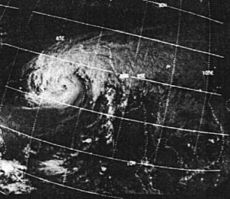Portal:Tropical cyclones/Featured article/1970 Bhola cyclone

The 1970 Bhola cyclone was a devastating tropical cyclone that struck East Pakistan (now Bangladesh) on November 12, 1970. It was the deadliest tropical cyclone ever recorded, and one of the deadliest natural disasters of modern times. At least 500,000 people lost their lives in the storm, mostly as a result of the storm surge that flooded many of the low-lying islands of the Ganges Delta. This cyclone was the sixth cyclonic storm of the 1970 North Indian Ocean cyclone season and was also the most powerful, reaching a strength equivalent to a Category 4 hurricane.
The cyclone formed over the central Bay of Bengal on November 8 and moved north, intensifying as it did so. It reached its peak with winds of 185 km/h (115 mph) on November 12 and made landfall on the East Pakistan coast that night. The storm surge devastated many of the offshore islands, wiping out villages and destroying crops throughout the region. In the most severely affected Thana, Tazumuddin, over 45% of the population of 167,000 was killed by the storm.
The Pakistani government was severely criticised for its handling of the relief operations following the storm, both by local political leaders in East Pakistan and in the international media. The opposition Awami League gained a landslide victory in the province and continuing unrest between East Pakistan and the central government trigged the Bangladesh Liberation War, which concluded with the creation of the state of Bangladesh.
Recently featured: Hurricane Fico — Hurricane Bob (1985) — Typhoon Ewiniar (2006) — 1998 Pacific typhoon season — List of named tropical cyclones — Hurricane Vince (2005) — Meteorological history of Hurricane Wilma — Browse